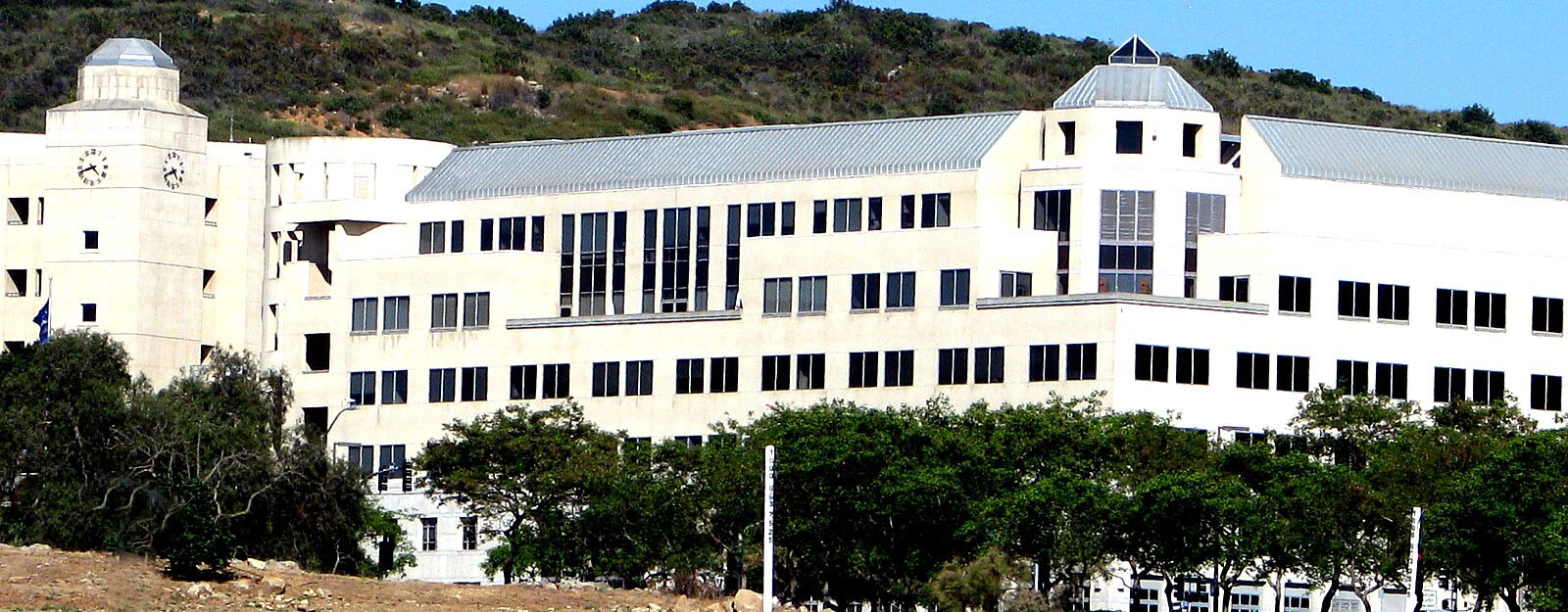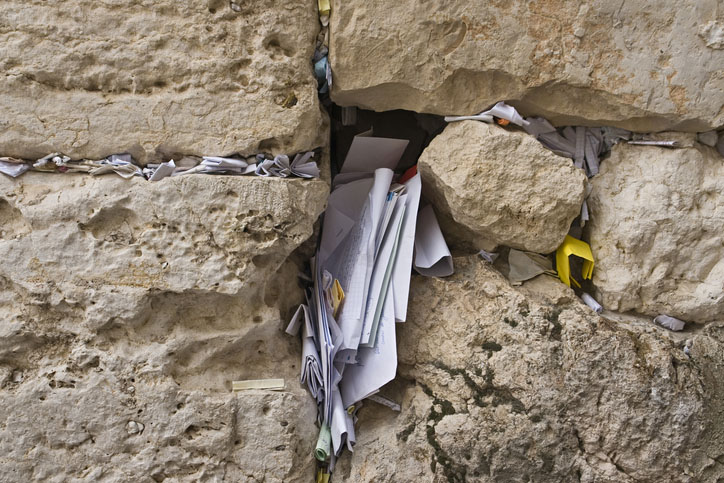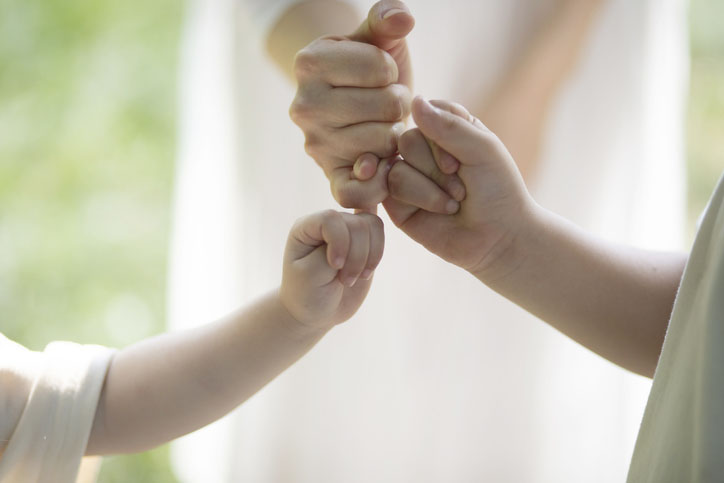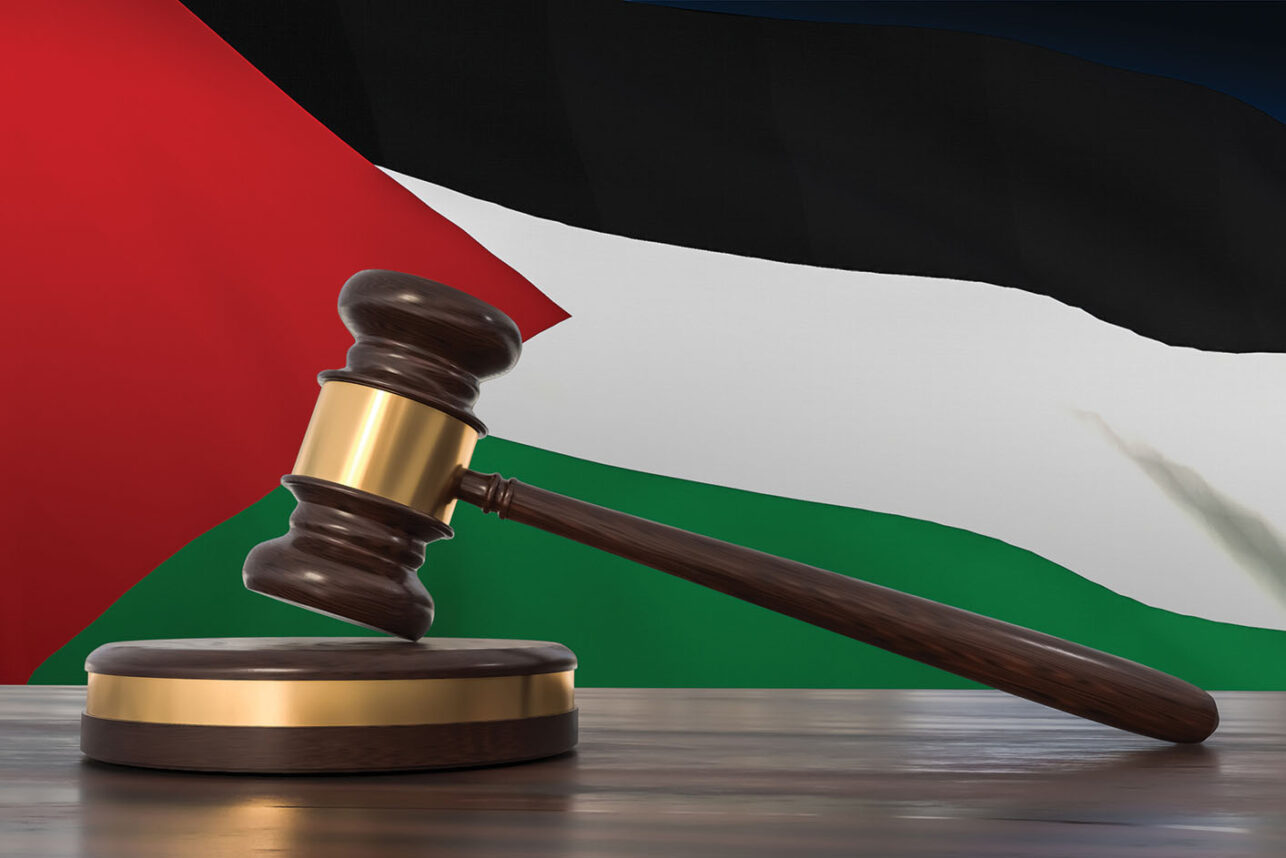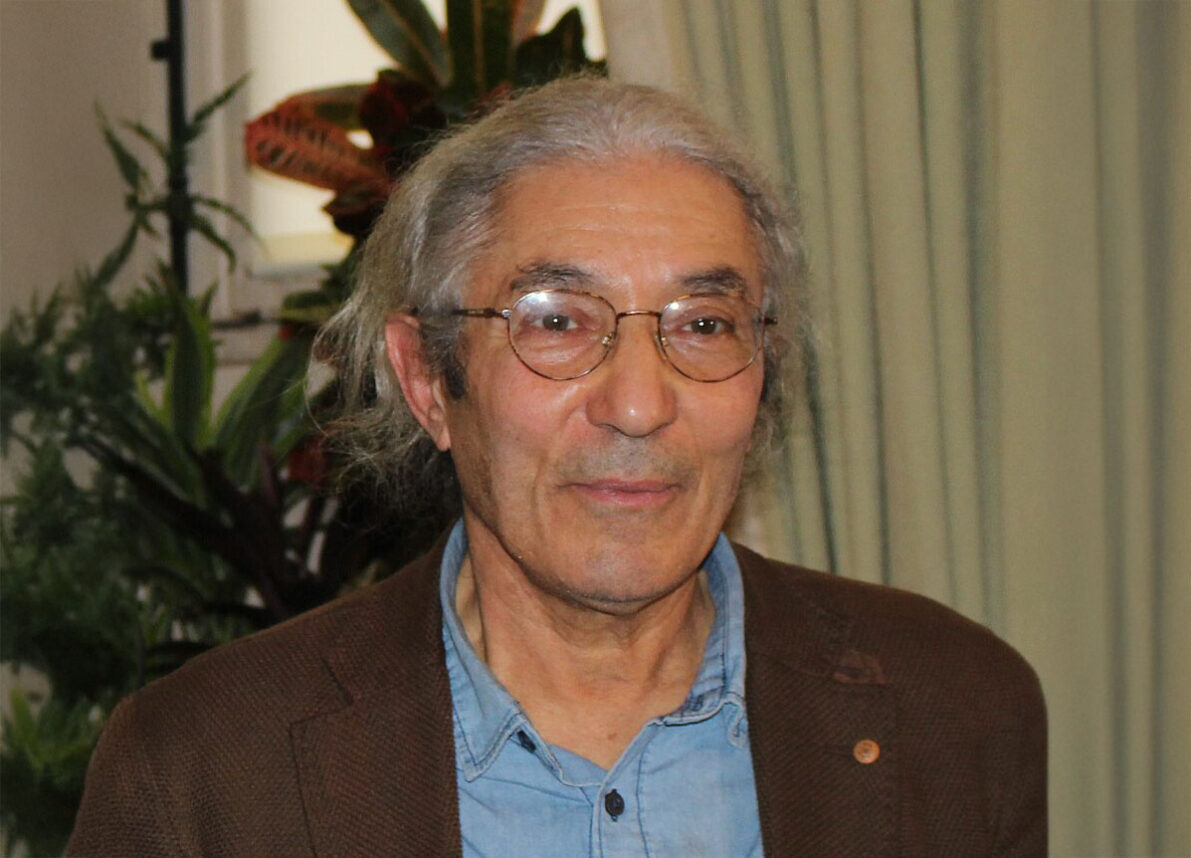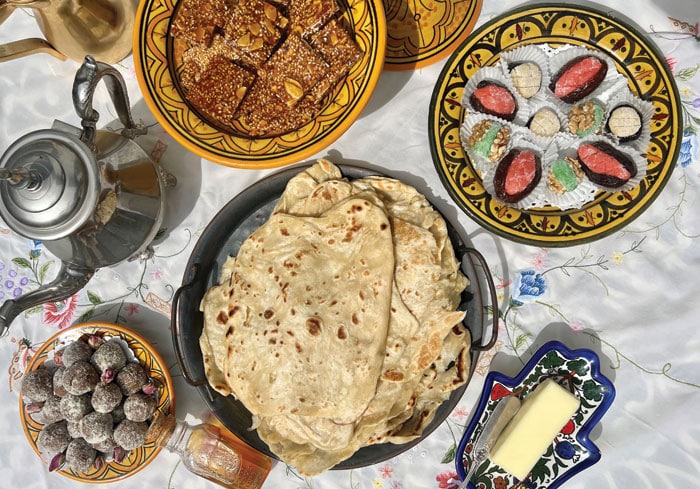
Editor’s note: Because the next issue of the Journal doesn’t come out until the day after Passover, we’re including this story on a Sephardic tradition for the last night of the holiday.
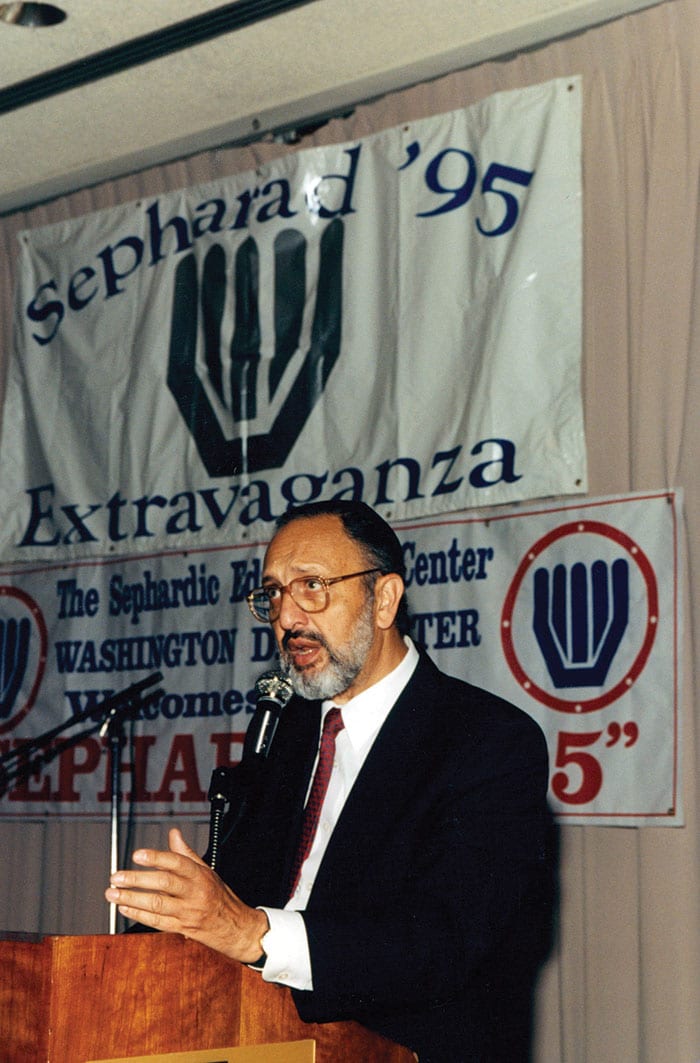
This week we hand our column over to Rabbi Benito Garzon who proclaims the wonders of the North African Mimouna. In 1970’s, he became famous throughout Spain as an educator extraordinaire. He was a true inspiration in teaching Judaism and he even taught Jewish philosophy to Queen Sophia of Spain. In 1979, he met Dr Jose Nessim, the founder of the Sephardic Educational Center, who appointed him the first Director of Education of the SEC in Jerusalem. For the next 30 years, he wowed young and old alike. He led hundreds of teens on the SEC Israel trips, he mesmerized the participants of the annual SEC Young Adult Conventions that took place in the 1980’s and 90’s throughout North and South America, and impressed the many adults who came to his classes on his visits to LA, Mexico, Miami, and South America. Now in retirement and living in Ra’anana, Israel with his wife Annie, Rabbi Garzon continues to participate in the SEC Metivta Rabbinical program in Jerusalem every year and organizes programs and classes in his community in Israel. Rabbi Garzon is the epitome of charm and our Sephardic brand of “Judaism with a Smile”.
—Sharon and Rachel
“Morocco, the beautiful country where I was born, is full of colors, aromas and flavors that embellish life, and ancient customs that fill it with divine and human meaning.
Mimouna is a feast and celebration that takes place at the end of Pesach, and friends and family gather around a table laden with delicacies.
The Mimouna festival (or “Timimouna” as it was known in Tetuan where I was born) is perhaps the best example. Indeed, this celebration which we Jews of Moroccan origin celebrate, shows the depth of our roots and the beauty of our heritage. Mimouna is a feast and celebration that takes place at the end of Pesach, and friends and family gather around a table laden with delicacies.
Dressed in festive clothes, the women in kaftans and the men in white “djellabas” and red “tarboush” (fez) that proclaim our origins, everyone is eager to eat moufletas and other delicacies that are offered in abundance.
Have you forgotten Moroccan hospitality? Have you ever seen Moroccans sitting around a table on Shabbat or on a holiday without inviting some neighbors or friends? Never! So, to welcome them properly, the door of the family home is wide open and will remain so all night. The guests will admire and then taste the many dishes generously offered by the hostess. Be careful, though! You might upset her if you refuse to try something, claiming that you don’t want to get fat. So promise yourself to start the diet tomorrow (it won’t be the first time you do it), and make your hosts happy!
How can you refuse this beautiful almond tart with a Spanish name… “Masapan“! Or lettuce dipped in honey to forget the bitter herb we were forced to swallow on Pesach, to make us feel the bitterness of the slavery from which we have just celebrated our liberation. All that is behind us.
Tonight, only tea and very sweet! No black coffee on the table but white milk and white eggs, the foods that sing of life. No sad colors. Tonight, everything must be a sign of joy and prosperity, of fertility and abundance. Like the bowl of flour in the center of the table, decorated with green leaves that herald spring. Or like the dough you see decorated with gold coins, a sign of success, and which will be used to make the Moufletas, the delicious soft pancakes that we will share, filled with butter and honey.
And here and there, all kinds of jams, not forgetting the popular pastries that take us back to our childhood memories, in other words, to our Moroccan roots, which are still alive: “corne de gazelle” and “marronchino” cookies, dates or figs stuffed with walnuts, almonds, “fijuelas” and “chebakia” (fried dough dipped in honey), “briouat” with almonds, “al’halwa” (sesame brittle)?
But… where do all these foods come from that we were forbidden to eat, or even to possess during Pesach? And what about that fresh fish, the promise of fertility, and these ears of barley which, spanning 20 centuries, evoke the Omer offering in the Temple of Jerusalem?
If you are asking yourself these questions, it is because you were not born here in Morocco. Imagine that it was our Muslim neighbors and friends who made sure that tonight we did not lack this food, or that it was the peasants who offered it to us as we left the Synagogue, even though they knew that we could not pay because until the stars came out we were forbidden to carry money. “Tjalles gadda”….You will pay tomorrow….”Mbarek el eid”…May the feast be blessed!
With this festival, we ignored the borders that some erect to divide us, we children of the same God celebrate together our common divine origin, singing the same melodies in Hebrew or Moroccan Arabic, laughing at the same funny stories of “Joha”, or quoting those popular sayings full of wisdom, many of which have their origin in the book of “Mishleh”, the Proverbs of Kiing Solomon, which the older generation read and meditate on: ¨Mishle Shlomo ben David, melekh Israel….” while the younger ones celebrate Mimouna with joy.
Historians, ethnologists and other scholars are trying to discover the origin of Mimouna. What for? We Moroccan Jews know that its origin is in our hearts and in our collective memory, where the best of us was born. Isn’t that so?
I don’t know if you know it, but we Moroccan Jews have the happy habit of associating God in all our joyous occasions. Ah, yes! Historians, ethnologists and other scholars are trying to discover the origin of Mimouna. What for? We Moroccan Jews know that its origin is in our hearts and in our collective memory, where the best of us was born. Isn’t that so?
And ask around you what beautiful expression in Arabic we pray to God to grant us a happy Mimouna. And when you have discovered it, make it heard, proclaim it, in Morocco, in Israel, in France, in Argentina, in the United States or in Canada, or wherever you are gathered to spread the light of fraternity, that magic light of Mimouna that the world needs so much today. (Of course, it is “Tirbah U’tsad!”).
– Rabbi Benito Garzon
As described by Rabbi Garzon, Moufleta is the food that we eat after Passover. In Morocco, the ingredients were brought to our homes by our Muslim neighbors. They knew the Jewish holidays as much as they knew their own.
We hope you have a chance to feel the joy and celebrate with hot, fluffy Moufletas with butter and honey. “Tirbah!!”
—Rachel
Sephardic Spice Girls Moufleta
4 ½ cups all-purpose flour
2 cups lukewarm water
¼ teaspoon yeast (optional)
¼ teaspoon salt
2 tablespoons oil, plus 1/2 cup oil (avocado or vegetable)
Butter, honey or Nutella, for serving
Sift flour and salt into a large bowl and make a well in the center. Add the yeast and slowly add water.
Mix the dough by hand until it is sticky but not smooth.
Pour 2 tablespoons of oil over the dough, cover with a towel and let rest for 30 minutes.
Divide the dough into golf ball-sized balls and set on a baking sheet.
Pour 1/2 cup oil over the balls, then turn balls over to completely cover with oil and let the dough rest an additional 15 minutes.
Lightly oil the counter and stretch each dough ball as thinly as possible.
Heat a nonstick frying pan and oil the surface by using a paper towel dipped in oil.
Place dough in the hot pan. When the dough is golden and bubbles a little, flip and place another piece of dough on top.
Continue to flip every few minutes, adding an additional piece of dough each time.
Remove the moufleta from the pan when there are 4 or 6 pieces of dough in the stack. Then start a new stack.
Traditionally served with sweet butter and honey but kids love it with Nutella.
Makes about 3 dozen.
Sharon Gomperts and Rachel Emquies Sheff have been friends since high school. The Sephardic Spice Girls project has grown from their collaboration on events for the Sephardic Educational Center in Jerusalem. Follow them on Instagram @sephardicspicegirls and on Facebook at Sephardic Spice SEC Food. Website sephardicspicegirls.com/full-recipes.








